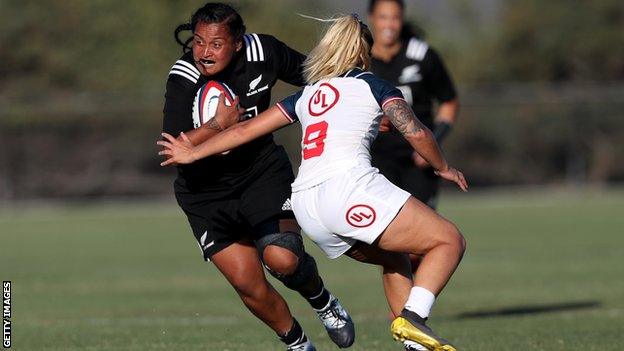Players report cultural insensitivity in NZ review
- Published

The review began after Te Kura Ngata-Aerengamate spoke out about mental health struggles while playing for New Zealand
New Zealand players have reported culturally insensitive comments and alleged "favouritism", "ghosting" and "body shaming" from coaches.
The allegations come as part of a cultural review of the Black Ferns set-up carried out for New Zealand Rugby.
The review was triggered after hooker Te Kura Ngata-Aerengamate said she had a mental breakdown, external following alleged comments by head coach Glenn Moore.
Moore is "committed" to learning from the review and remains head coach.
Defending champions New Zealand will host the World Cup later this year, with the first match played on 8 October.
New Zealand Rugby (NZR) chief executive Mark Robinson apologised for "not having provided all the tools for our people to succeed".
Ngata-Aerengamate put up an Instagram post on 8 December 2021 revealing her mental health struggles, shortly after an unsuccessful tour of Europe on which the defending champions lost twice to both England and France.
Allow Instagram content?
This article contains content provided by Instagram. We ask for your permission before anything is loaded, as they may be using cookies and other technologies. You may want to read Meta’s Instagram cookie policy, external and privacy policy, external before accepting. To view this content choose ‘accept and continue’.
The resulting review, published on Monday, found that the player's concerns "were not isolated and some other players (particularly Maori or Pasifika players) had either experienced similar behaviour by a number of members of management (of 'favouritism', 'ghosting', cultural insensitivities), or had witnessed it".
When asked why they did not complain about such behaviour, some said "they were worried it would adversely affect selection chances".
Given approximately 50% of the side are Maori and 25% are Pasifika, the review said "a greater understanding from management on how to communicate with these players in a culturally sensitive and safe manner" is needed.
One anonymous player was quoted as saying: "There needs to be selection of the best players, rather than [it] being based on favouritism."
The report added that a focus on weight measurements rather than performance in strength and conditioning "can lead to some experiencing body shaming".
Other issues raised by the review include:
The fact that "there is no clear or consistent high-performance vision, practices or mind-set" for the Black Ferns despite them being five-time world champions.
After a 2017 report produced similar findings, there is a need to monitor review outcomes "so they do not become 'public relations' exercises rather than vehicles for sustainable change".
Player concerns about "insufficient investment in understanding how to coach women".
Returning to play following pregnancy, with one player saying this "is a very grey area".
How have New Zealand Rugby responded?
Head coach Moore said in a statement, external that he would work towards "a high-performance culture" that "achieves a healthy balance" between personal wellbeing and "the pressures that come from meeting expectations and competing at an elite level of sport".
In February, the governing body announced 29 professional contracts after part-time deals were first introduced in 2018 and a semi-professional club competition was launched the following month.
More recently, former All Blacks assistant coach Wayne Smith has joined the Black Ferns as a technical coach.
NZR said it accepted the review's "key themes and recommendations" and chief executive Robinson added: "No one should be in any doubt about our commitment to the progression of women's rugby in this country.
"This report highlights that we haven't got everything right."
NZR said it would "create additional support and resource to focus on team culture and leadership" as well as placing emphasis on "existing policies and new initiatives that focus on the health and wellbeing of players and management".